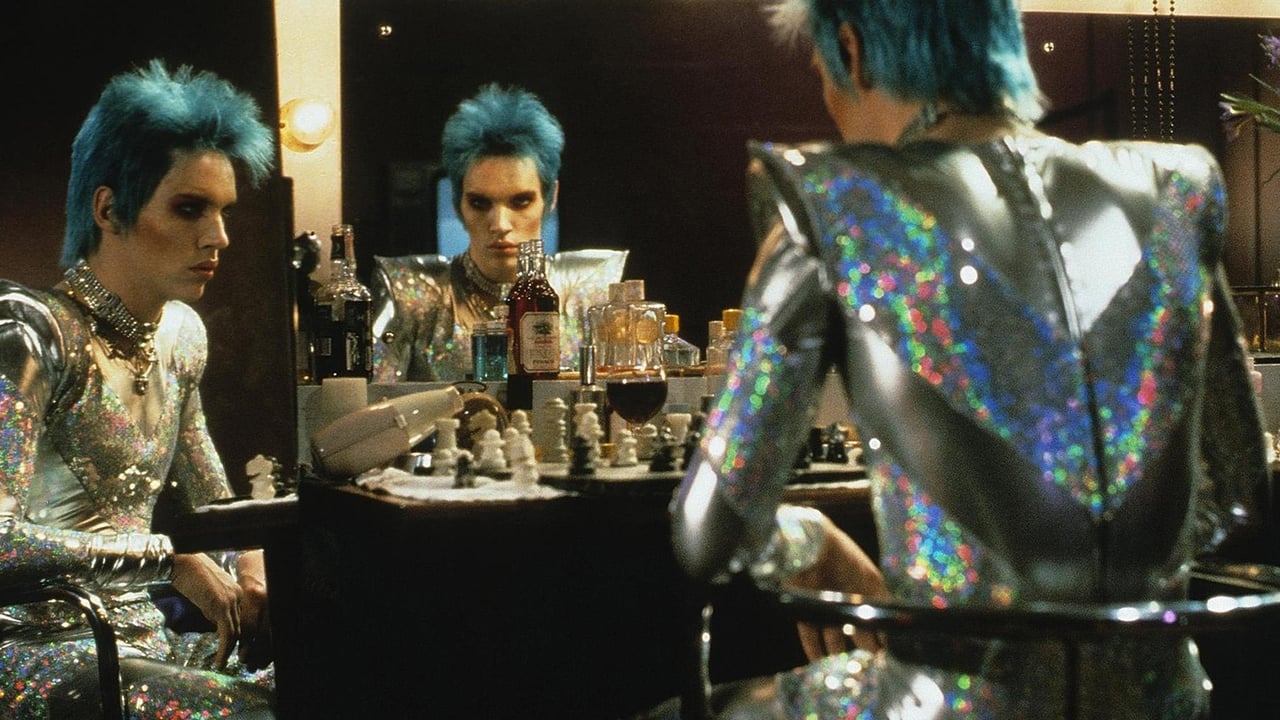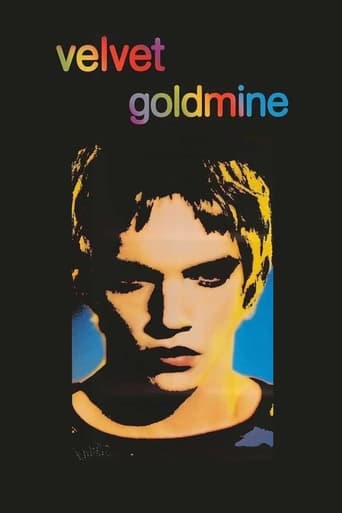

Very interesting film. Was caught on the premise when seeing the trailer but unsure as to what the outcome would be for the showing. As it turns out, it was a very good film.
... View MoreIt’s not bad or unwatchable but despite the amplitude of the spectacle, the end result is underwhelming.
... View MoreThis is a dark and sometimes deeply uncomfortable drama
... View More.Like the great film, it's made with a great deal of visible affection both in front of and behind the camera.
... View MoreAll been said already, only that Slade reminds more of Jobriath than Bowie, when performing.. Love the movie, just watched it again after many many years..
... View MoreA glam rocker quits 'the life' in a spectacular way. He then disappears. Years later a journalist is assigned to find out where the rocker is today. Good premise thus far, then come the flashbacks - how he came to be discovered, how he went off the deep end, etc. We learn the journalist has some relationship with some of the principal characters. The musical scenes were well done, but that's the last good thing I can say about the film. Unless you're really into glam rock or have an unusual ability to concentrate on the banal, I warn you that you may not be able to figure out what the incessant flashbacks and portrayal of debauchery is adding to the plot. I suspect I'm not alone is asking why you'd want to try?! By then end I didn't care if Christian Bale figured it out.
... View MoreVelvet Goldmine is centred on the glam movement of the early 70s, and most of the people and incidents in the film are loosely based on real people and occurrences. It follows the rise and fall of a Ziggy Stardust-type character, Maxwell Demon (Brian Slade), and those around him, and at the same time, the deep influence he had on a fan's life (Arthur Stuart). Brian Slade retires in a hoax and disappears; a decade later, in the conservative, depressing, Cold War Reagan-era the now reporter Arthur is tasked with finding out what happened to Brian Slade, taking him back to his own past, and exposing a cover-up. Judging by many of the comments here, people are a bit confused by this film. It wasn't meant for a mass audience; some background is helpful to appreciate it.First, to address some criticisms: 1. the time line is confusing – it's not meant to be a linear tale; pay attention, it shifts between past and present 2. not factually accurate – it's not a biography! 3. the costumes aren't accurate – true! the clothing was improved; the costumes play a very important part in the contrast between past and present and the overall development of the story 4. drags a bit in some places, with weird music video sequences – perhaps an homage to some 70s directors? 5. the American scenes were so obviously not in America – so true, this really does detract from the film, but I'm guessing budget was the issue here 6. male sexuality – double-standard here; seems that it's OK to exploit women sexually and show them naked in movies, but not OK to sexually exploit men or show gay sex scenes, even tasteful ones 7. Todd Haynes (director/writer) is American – will be discussed more below Although this film has a cult following among younger people, glam rock was mainly influential to two generations; first, the younger Baby Boomers – glam rockers often name-checked artists, authors, and musicians, so they also helped introduce the arts to their fans; many formed their own bands. Second, Gen Xers were also influenced by this era, as many of their favourite bands were glam rock fans and name-checked their influences. As a result, Gen X music fans bought old David Bowie, Roxy Music, T Rex, etc albums and read the unauthorised biographies of David Bowie. In turn, many of these Gen Xers were also inspired to form bands or get involved in arts and fashion. The Britpop/Cool Britannia era of the 90s owes a lot to glam rock, but its influence has never been limited to the UK. Todd Haynes' country of residence is irrelevant; it's obvious that he was deeply influenced by the era and knows the mythology surrounding it very well.Helpful context: During Bowie's 'Let's Dance' comeback in the early 80s, he faced much criticism for trying to erase his past image. Bowie did not disappear as in the film, he actually made some extremely influential albums as 'The Thin White Duke,' but then he came back as a whitewashed, corporate type. Fans of his previous work were disappointed, and many journalists of the time commented on this, for example, Neil Tennant, who was writing for 'Smash Hits' (USA 'Star Hits') at the time, and whom Arthur is probably based upon.It is necessary to be familiar with the glam era and David Bowie to appreciate this film properly. Oscar Wilde is also quoted and paraphrased extensively in the film, and all the major players are shown as carrying or passing on his pin.Velvet Goldmine has been compared to Citizen Kane in structure, which is correct, but in content, I disagree. It is not really a 'rise and fall' tale, but more of a personal story, about the nature of the image versus the self, how much of one's self should be in one's art, etc, and about stepping out of someone else's shadow and creating one's own legacy.Not enough good things can be said about the actors; these were challenging roles, but acted beautifully. Also, actors are usually bad at playing musicians, so it was great to see that all of the musicians/pop stars besides Brian Slade and Curt Wild were played by actual pop stars/musicians. Also, Lindsay Kemp (Bowie's acting teacher) has a small role in this. Check out the cast list, it's really impressive.Here's a cheat sheet of who's based on who: Brian Slade – David Bowie; Curt Wild – Iggy Pop, also sometimes Lou Reed; Arthur Stuart – Neil Tennant, shades of Morrissey; Jack Fairy – composite character, at first loosely based on Marc Bolan, later Thin White Duke Bowie, but not really based on any one person; Jerry Devine – Tony Defries; Shannon – Coco Schwab; Mandy Slade – Angela Bowie; Cecil – Ken Pitt; Polly Small – Patty Smith; Rodney – Rodney Bingenheimer
... View MoreI saw this movie on Bravo so my comments are based on the edited cable version.A) I think this topic would have been better handled by a director who had lived and experienced this music and era in general as a teen-ager or young adult, unlike Haynes. The director seemed to be making queer theory political points wrapped in glitter rather than presenting an understandable epic of that epoch, probably leaving many heterosexual viewers out in the cold. The reference to Ronald Reagan ( President Reynolds in the movie) is one example. It is absurd to imply that Reagan was somehow responsible for the death of glam as it is for some gay activists to blame him for the spread of HIV. Nevertheless, I found the film enthralling both for the visuals and the recognizable historical figures and events B) I was somewhat connected to the rock scene of that time and to glam in particular so I think I have some insight to offer younger readers, although I am sure Haynes himself has more knowledge of gay history and "inside" glam gossip than myself.C)The "green pin" may combine both alien power as in the Green Lantern comic books that Haynes probably read as a child ( childhood is given strong play in the beginning ) and an icon of homosexual experience passed on from one time period to the next as expressed by Allen Ginsburg. Ginsburg once told of how ,through a series of sex partners going back in time, he was connected to Walt Whitman. Not exactly glam but he was a poet like Wilde, and Whitman's work is known for it's ethereal, pre-maturely modern tone as in "I sing the body electric" ( Alien Anal Probes anybody ? ). That poem was written over 20 years before anybody had electricity in their home. It was also the source of the title of a science-fiction story written by Ray Bradbury. Another film connecting UFO's,bohemian sex and alternative music is "Liquid Sky", which I am sure influenced Haynes.D) The Slade character is obviously based on Bowie, who came to be known to non-glam fans via his title role in the science-fiction movie " The Man who Fell to Earth" . Gay equals alienated equals "alien" may explain the UFO at the beginning. Bowie is much more talented than the Slade character whose vapidity and posing is similar to the now obscure real-life person known as "Jobriath", who like many who led the "drug,sex and rock'roll lifestyle" of the seventies died of AIDS in the 80s. Like Slade and Davie Jones/David Bowie/Ziggy Stardust, Jobriath also performed under a second stage name ( Cole Berlin ) Unlike Bowie but similar to Slade, Jobriath blamed his brief career on the failures of an egotistical manager.E) Ewan's Iggy stage performance was a great impersonation, almost comical in it 's accuracy.F) I could not figure out who Jack Fairy was based on but he reminded me of Klaus Noemi, whose cover of "You Don't Own Me" can still be heard on the Rush Limbaugh program.At last, an actual semiotic signifier that the Reaganites did co-opt glam !!!
... View More